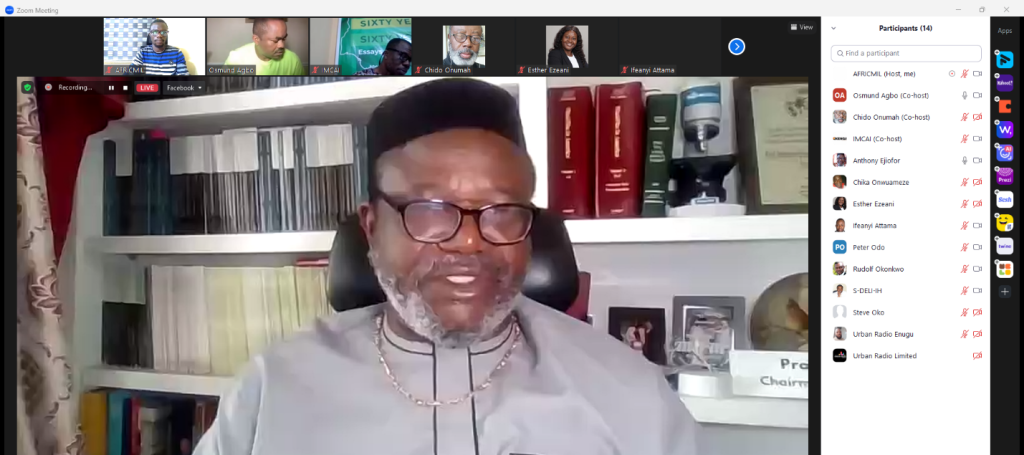Stephen Ukandu, Umuahia
Chairman, World Igbo Congress, WIC Professor Anthony Ejiofor, has said that the age-long agenda of the Fulani Caliphate to conquer and Islamise Nigeria is still alive.
Professor Ejiofor who made the submission Thursday night while featuring on Ikengaonline town-hall, said the amalgamation of Nigeria in 1914 was considered by the jihadists as a temporary halt to the agenda.
The WIC chairman who spoke on the theme: “Insecurity in the South-East: The Role of the Nigeria Diaspora,” said that the jihadists see the Igbo as the only obstacle to the actualisation of their Islamisation agenda.
He noted that Fulani herdsmen and bandits wreaking havoc in parts of the country especially in the South-East are all foot soldiers of the jihadists whose ultimate goal is to complete the vision of Usman Dan Fodio who had vowed to dip the Quoran in the Atlantic ocean.
“Whether you call them Boko Haram, or herdsmen or bandits, or ISWAP, or jihadists, they are all foot soldiers of Islamisation.”
According to him, the expansionist agenda of Usman Dan Fodio who in 1804, established a caliphate in Sokoto through brutal militancy, is still being pursued by the his foot soldiers who are bent on conquest and subjugation of the indigenous tribes in Nigeria.
“To many Fulani, the British by the amalgamation of Nigeria, simply halted the march to the Atlantic ocean,” he said.
The US-based Professor of Biochemistry regretted that while the Igbo nationalists like Dr Nnamdi Azikiwe, gave their all for a united Nigeria, their Northern counterparts had a sectional mindset.
He, however, noted that despite brazen efforts to subjugate the Igbo, the tribe had remained resilient and ingenious.
“Igbo are irrepressible; it’s in our DNA. We keep bouncing back despite the persecutions against us right from the civil war.
“We have never occupied any major position in the Nigeria Government, yet we keep pushing on in different frontiers.”
Professor Ejiofor further identified causes of insecurity in the South-East to include: blind eye of the Federal Government to the atrocities of killer herdsmen, exclusion by the Federal Government especially under the watch of President Muhammadu Buhari; joblessness; lack of federal presence; among others.
“There is no sea port in the South-East despite the fact that Ndigbo are the major importers and exporters in Nigeria. There is no major international airport in the South-East, yet 53% of travelers in Nigeria are Igbo.”
He, however, submitted that Ndigbo in the diaspora have a crucial role to play in arresting insecurity in the South-East, which, he regretted had ruined the economy of the zone besides loss of lives and property.
Ikengaonline town-hall meetings are meant to discuss topical issues affecting the South-East geo-political zone in particular and the country at large.
The April 2023 edition of the Ikengaonline town-hall had former central bank deputy governor, Professor Kingsley Moghalu as guest speaker. The maiden edition of the town-hall featured the immediate-past Senate Minority Leader, Senator Enyinnaya Abaribe, in July 2022; while the second edition featured a renowned Political Economist, Professor Pat Okedinachi Utomi, in August.
Former President General of Ohanaeze Ndigbo, Chief Nnia Nwodo; US-based academic, Professor Okey Ndibe; West African Regional Director, Ford Foundation, Dr Chichi Aniagolu-Okoye; as well as multi-award-winning actress and Director of Communications, Actors Guild of Nigeria (AGN), Monalisa Chinda Coker, had all featured at different editions of the explosive 90 minutes show. Dr. Oby Ezekwesili opened the 2023 town-hall series in February as guest speaker while former minister of Finance, Dr. Kalu idika Kalu, featured in the March edition.
Ikengaonline is a South-East-focused online media outfit which aims at giving voice to citizens of the South-East, parts of Rivers and Delta states, and highlights the challenges facing the region.
Ikengaonline is a publication of Ikenga Media and Cultural Awareness Initiative (IMCAI), a non-profit entity that seeks to promote positive socio-cultural values, accountability and good governance through media and public education.
It is part of the Collaborative Media Engagement for Development Inclusivity and Accountability Project, a multi-level intervention for media independence and government accountability, managed by the Wole Soyinka Centre for Investigative Journalism (WSCIJ) and supported by MacArthur Foundation.

